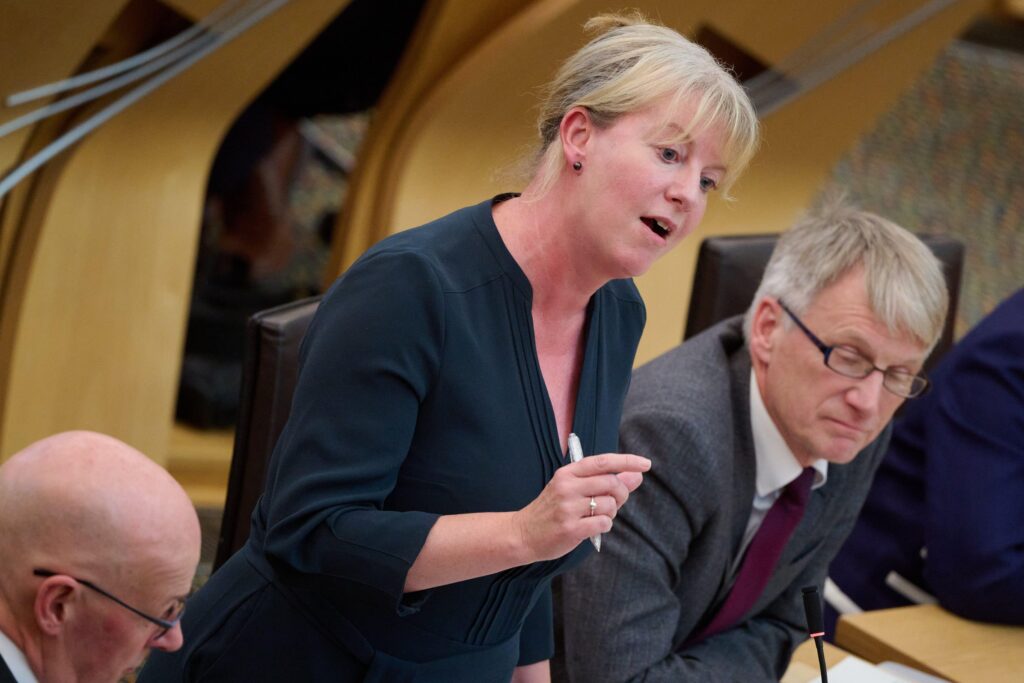Shona Robison, the finance secretary, announced measures to save hundreds of millions of pounds in a letter to Holyrood’s finance committee.
Cost savings across the Scottish government will mean cuts to mental health funding, charities and care services.
Ukrainians being resettled in Scotland will even have to pay £3 for their dinner having previously been given the meal free while in concessionary accommodation.
Shona Robison, the finance secretary, detailed more than £188 million of fresh savings in a letter to Holyrood’s finance committee.
The largest chunk of that was £115.8 million from health and social care, making the NHS a casualty. As well as almost £19 million being cut from mental health services, the national care service and adult social care is losing £13.6 million.
Some of the latter savings will come from uptake of the reopened independent living fund, which supports disabled people, being slower than anticipated in the first half of the year, meaning not as much money will be required.

Optometry, Covid-19 programmes, education training and digitisation spending are being reduced. Nearly £8 million will be cut from central government funds to third sector and community organisations while £6 million of higher education student support will be lost.
Marketing spend across the government is also being reduced including in key areas such as tourism and decarbonisation. There will be £24 million taken from the travel budget, largely the result of the end of the peak rail fares pilot.
Robison said action was necessary as the SNP government faced £800 million of additional costs. She cited public sector pay deals, prolonged austerity from Westminster, inflation, the pandemic and war in Ukraine as factors.
Emergency spending protocols, including recruitment freezes and overtime bans, are expected to save £60 million while diverting funds previously earmarked for the winter fuel payment will be worth £160 million.
A further £460 million raid on the ScotWind money, generated from fees for offshore wind farm projects, will be required to help balance the budget for this year with Robison saying the package of measures frees up £933 million in total.
Last week the Scottish Fiscal Commission, the nation’s official economic forecaster, said the spending crisis was largely of the government’s own making because of its decision to offer above-inflation pay deals and more generous welfare benefits.
Liz Cameron, chief executive of the Scottish Chambers of Commerce, said Robison’s decisions underlined the scale of the financial challenge and called for wider reform of public services to tackle the long-term challenges.
She said: “Businesses understand that tough decisions must be made, but we also need certainty from the government that growing the economy remains the top priority.
“We have been clear about what businesses are asking for. A reduction in the overall taxation burden which is undermining the ability of Scottish business to attract and retain talent, a close look at cutting the mountain of regulation adding costs to business and consumers [and] a coherent energy strategy which protects jobs and investment.
“We do not underestimate the scale of the challenge which is impacting communities across the United Kingdom. That’s why we need to see a clear plan of how the Scottish and UK governments intend to work in partnership to support economic growth and business investment which is the only route to fund vital public services.”

Laurie Macfarlane, the co-director of the Future Economy Scotland think tank, said John Swinney’s missions to end child poverty, improve public services, deliver net zero and strengthen the economy would be critically undermined by the cuts.
He said: “While Scotland’s fiscal pressures are partly a result of UK government spending decisions, the Scottish government is not powerless to act.
“The finance secretary could have harnessed devolved tax powers to raise revenue and offset the need for cuts. For example, research from the Scottish Trades Union Congress shows that replacing council tax with a progressive property tax could raise £1 billion a year. Spending cuts are always a political choice; the Scottish government should use its powers to avoid them.”









